book2unit2
- 格式:ppt
- 大小:93.00 KB
- 文档页数:17



2021高考英语大一轮复习资料Book2 Unit2话题词汇1.aboard prep.上(船、飞机、火车、汽车等)2.accommodation n.住宿;膳宿3.destination n.目的地;终点4.enjoy v.欣赏;享受乐趣;喜欢5.guide n.导游;向导6.luggage/baggage n.行李7.place of interest名胜8.be struck by...被……迷住9.have a good trip旅行顺利 10.take a picture拍照话题佳作假设你参加了某国际旅行团的意大利三市游(罗马—佛罗伦萨—威尼斯)。
今天你参观的是佛罗伦萨。
请根据下面表格提示,写一篇游记。
参观城市及景点介绍米开朗基罗广场、大卫塑像、乌菲兹美术馆……参观感受及旅游计划佛罗伦萨位于……敬仰古代伟大的艺术家……准备明天进行下一城市的参观(威尼斯) 佳作欣赏 Oct.4th,FridayFine Here I am in Florence,a world-famous tourist city in the middle of Italy.It is not only the most famous cultural art center in Europe,but also the home of the Renaissance.Firstly,I came to the Piazzale Michelangelo,from where I looked over the beautiful sights of the whole city.Then,standing in the middle of the square is the sculpture of David,which is the symbol of the city.I couldn’t help showing my respect to the ancient artists.At last,I came to the Uffizi Gallery,where a lot of artworks are displayed by great artists.I am so attracted by them that I really want to stay here for a few more days.However,I must leave for Venice,another famous city in Italy tomorrow morning. 名师点睛作者能够仔细审题,按照题目要求,出色地将题中的要点表达出来。
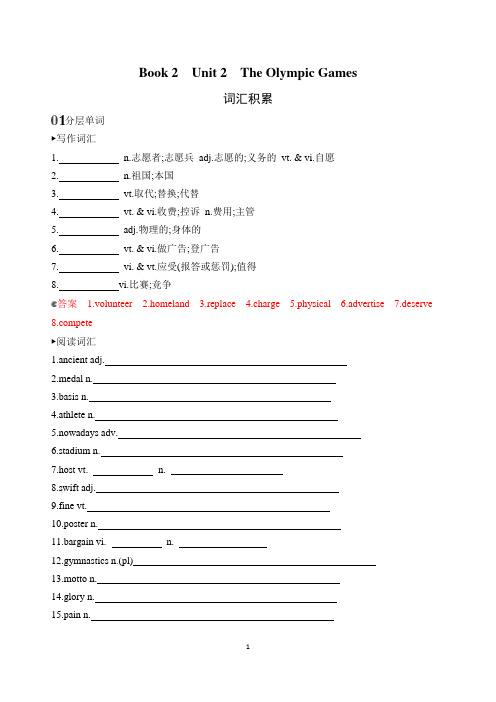
Book 2Unit 2The Olympic Games词汇积累分层单词▶写作词汇1.n.志愿者;志愿兵adj.志愿的;义务的vt. & vi.自愿2.n.祖国;本国3.vt.取代;替换;代替4.vt. & vi.收费;控诉n.费用;主管5.adj.物理的;身体的6.vt. & vi.做广告;登广告7.vi. & vt.应受(报答或惩罚);值得8.vi.比赛;竞争答案 1.volunteer 2.homeland 3.replace 4.charge 5.physical 6.advertise7.deserve pete▶阅读词汇1.ancient adj.2.medal n.3.basis n.4.athlete n.5.nowadays adv.6.stadium n.7.host vt. n.8.swift adj.9.fine vt.10.poster n.11.bargain vi. n.12.gymnastics n.(pl)13.motto n.14.glory n.15.pain n.答案 1.古代的;古老的 2.奖章;勋章;纪念章 3.基础;根据 4.运动员;运动选手 5.现今;现在 6.体育场7.做东,主办,招待主人8.快的;迅速的9.罚款10.海报;招贴11.讨价还价,讲条件便宜货12.体操;体能训练13.座右铭;格言;警句14.光荣;荣誉15.疼痛;痛苦▶拓展词汇1.vi.比赛;竞争→n.竞争→adj.竞争的;有竞争力的→n.竞争者2.adj.规则的;定期的;常规的→adv.定期地;有规律地3.vt. & vi.容许;承认;接纳→n.准许加入;入场费4.n.责任;职责→adj.负责的5.adj.愚蠢的;傻的→n.傻瓜vt.欺骗;愚弄答案 pete;competition;competitive;competitor 2.regular;regularly 3.admit;admission 4.responsibility;responsible 5.foolish;fool高频短语1.参加;参与2.代表;象征;表示3.也;又;还4.一个接一个地5.拾起;捡起;用车接某人6.代替……7.在……中起作用8.主管;看管;负责9.除了……外答案 1.take part in 2.stand for 3.as well 4.one after another 5.pick up 6.take the place of 7.play a role in8.in charge9.apart from经典句型1.I lived in(你们称之为……的地方)“Ancient Greece” and I used to write about the Olympic Games a long time ago.2.(正是在夏季奥运会上)you have the running races, together with swimming, sailing and all the team sports.3.No other countries could join in,(奴隶和妇女也不能参加)!4.Women(不仅被允许参加,而且还在……中起着非常重要的作用)gymnastics, athletics, team sports and...5.There’s(争取奥运会承办权的竞争就跟……一样激烈)to win Olympic medals.6.She was very beautiful and could(比任何一个男人跑得都快)in Greece.7.She(如此生气以至于)she said to her father that she would not marry anyone who could not run faster than her.8.This is important because(你说的英语越多,你的英语就会越好).答案 1.what you call 2.It’s in the Summer Olympics that 3.nor could slaves or women4.are not only allowed, but play a very important role in5.as much competition among countries to host the Olympics as6.run faster than any man7.was so angry that8.the more you speak English, the better your English will becomeBook 2Unit 2The Olympic Games课文与语法填空阅读下面短文,在空白处填入1个适当的单词或括号内单词的正确形式。


Unit TWO Journey into the unknownObjectives1. To learn some new words and phrases2. To practice the listening skill--- understanding the problem-solution pattern3. To talk about asking for and giving directions4. To conduct a series of listening and speaking activities on how to discuss and organize ideas (e.g. pair work, group work, etc.)Focus1. Understanding & using the key words, phrases and expressions in this unit2. Understanding the main idea of the listening material and complete the related exercises3. Practicing the listening skill of understanding the problem-solution pattern4. Practicing the speaking skill--- how to discuss and organize ideasDifficulties1. Understanding the main idea of the listening material and complete the related exercises2. Practicing the listening skill of understanding the problem-solution pattern3. Practicing the speaking skill--- how to discuss and organize ideasStep 1 Opening upRead the following quotes about traveling. What does each quote mean? Do you agree with them? Why or why not?Text book P20Step 2 Listening to the worldSharing1. Watch a podcast for its general idea.The podcast is mainly about people’s traveling experiences and what they like and don’t like about traveling.2. Watch Part 1 and fill in the blanks with the words that Finn uses.1) different countries2) home3) new places4) new cultures3. Do they travel a lot? Look at the people below and read the statements. Then watch part 2 of the podcast and check(√) the true statements.1 Travel is her passion.2 He has been to Istanbul twice.3 She has done little traveling on holidays.4 She gets excited about going to any country.5 She loves to travel to different countries.6 He has been traveling for 12 years.7 She has been to Turkey, India, and Malta.8 As an expedition leader, he often works in the United Kingdom.Answers1 √2(He has been to Istanbul once.)3(she has done quite a bit of traveling on holidays.)4 √5 √6(He has been traveling for about two and a half years.)7(she has been to Turkey, Egypt and Malta.)8(As an expedition leader, he often works outside the United Kingdom.)4. What do they like about traveling? Look at the people below and read the statements. Then watch part 3 of the podcast and fill in the blanks.A He thinks that traveling helps a person 1_______a lot and learn completelydifferent experiences.B She loves the 2______experience.C He loves to see art. And she loves to see 3________in other countries.D He can see the most beautiful4 ________ around the word.E He likes getting out there and experiencing a different 5____, getting far a wayfrom what he’s used to, and meeting new people.F She loves being in a new place, seeing very different things, hearing a different6_____, and eating different food.Now watch again and check your answers.4 Answers1) mature2) airport3) theater4) scenery5) culture6) language5 What don’t they like about traveling? Look at the people below and read the statements. Then watch part 4 of the podcast and match the statements 1-6 to the people A-F.1 I suppose plane journeys aren’t always the most exciting of things.2 I don’t like long flights.3 When I was backpacking, and we all …we ran out of money, or we were in dangerous situations, I actually quite enjoyed that.4 Flying. I don’t particularly like flying, but it’s a necessity when you live in Ireland, you know.5 You spend a lot of time outside the United Kingdom, and the disadvantage of that is, that you, you tend to miss families and friends.6 I suppose the biggest problem I have with traveling is living out of a suitcase.Now watch again and check your answers.AnswersBAECFD6. Work in pairs and discuss the questions.1. Do you like traveling? Why or why not?2. Have you traveled much? Where have you been? What did you like most?3. If you can afford the money and time, which place(s) would you love to go? Why? Reference answers1. I like traveling a lot. It is a good experience since it helps people escape from the pressure of city life and the boredom of daily routine. What’s more, the contact with different cultures helps broaden the mind and probably change our way of living and thinking.I don’t like traveling. I like the stability and the secure, warm feeling of home, which make me feel comfortable. Hotels or other people’s houses are poor substitutes for home, and I really don’t like sleeping in strange places or being away from home for a long time. I don’t get enough out of traveling to justify the discomfort of being away from home.2. I haven’t traveled much so far, but the backpacking trip I had in Yunnan is an unforgettable experience. I walked on foot along the Yangtze river for a long distance, occasionally going down to the valley to appreciate its majestic power and beauty. What I liked most was to drift along the river on a bamboo raft. It seemed to me that the river had a life of its own with the current either drifting in leisure or raging forward with force. Tiring as the trip was, I was greatly rewarded with what I felt and what I experienced.3. If I had enough time and money, I would choose to go to the American west, to visit the deserts, the canyons, and the mountains, and to totally get immersed into the wilderness. Probably only by going deep unto nature can we truly find our true self, our real value, and our relation with others and the world.Step 3 ListeningBEFORE you listen1.Work in pairs and discuss the questions.What do you know about Venice?Venice is a city in danger. What do you think the major problem might be? Listening skillsWHILE you listen2. Read the questions. Then listen to a man’s talk and answer the questions.1 what problem is Venice facing now?2 how serious is the problem?3 what measure is being adopted to save the city?4 what does the speaker think of the measure?5 what advice does the speaker give in order to save the city?Reference answers1 the city is slowly sinking.2 Venice is sinking at a rate of two and a half inches every decade.3 barriers are being put in to try and stop the water getting too high.4 it is a temporary measure.5 put pressure on the government to spend the money it needs to find a permanent solution to the problem.3. Listen to the talk again and check(√) the true statements.Answers1 (ever since the 14th century attempts have been made to save Venice.)2 (there are as many as 40 floods in Venice between march and September every year.)3 √4 √5 √After you listen4. Work in pairs and discuss the questions.1 Can you think of any other problems threatening tourist cities around the world?2 In your opinion, what measures should be taken to tackle the above problems? Step 4 ViewingBefore you view1 Read the program information below and answer the questions.1 What do you know about the five places mentioned in the following program,information?2 Which places do you think is the number one place to see?2 read the statements and the answer choices. Then watch the video clip and choose the best answers.1 According to the program, Bangkok is an important place for____.A tourists around the worldB people of ThailandC temple loversD Buddhists2 To Joanna Lumley, the Masai Mara is so special because___.A it is a fantastic place for studying animal behaviorB the open spaces and wild animals are impressiveC the African sky is particularly cleat and blueD the animals there live in complete freedom……Answers1 D2 B 3B 4C 5D3Read the statements. Then watch the video clip again and fill in the blanks.1With over six million people, it’s big, it’s______and you love it! It’s very good for ____ and the nightlife is great, too.2It’s got lots of clubs, ______, shops, food… everything you _____, really.3Huge open ______ , fantastic animals, just wide open freedom, warmth, _______, and all underneath the great African skies.4To me, Paris is ______, romantic and ________.5And behind Cape Town is the 1,000-meter-high table mountain, with its fantastic_______.6Friendly people, loads of _______.7With every ________ inch of the ______, the colors in the canyon change.8I remember actually sitting there…and I just______.Now watch again and check your answers.Answers1 busy, shopping2 bars, need3 spaces, friendliness4 elegant, expensive5 views6 beaches, cheap7 changing, sunset8 cried4. Discuss the questions.1. Which places in the world would you like to visit? Make a list of three places and give your reasons.2. Which attracts you more: a natural or cultural landscape? Why? Assignments:1. Reviewing new words and phrases of Unit 12. Listening to “Further Practice in Listening” again after class.3. Working in pairs and practice how to discuss and organize ideas.。


Text A课文AThe humanities: Out of date?人文学科:过时了吗?When the going gets tough, the tough takeaccounting. When the job market worsens, manystudents calculate they can't major in English orhistory. They have to study something that booststheir prospects of landing a job.当形势变得困难时,强者会去选学会计。
当就业市场恶化时,许多学生估算着他们不能再主修英语或历史。
他们得学一些能改善他们就业前景的东西。
The data show that as students have increasingly shouldered the ever-rising c ost of tuition,they have defected from the study of the humanities and toward applied science and "hard"skills that they bet will lead to employment. In oth er words, a college education is more andmore seen as a means for economictrend that i betterment rather than a means for human betterment.This is as likely to persist and even accelerate数据显示,随着学生肩负的学费不断增加,他们已从学习人文学科转向他们相信有益于将来就业的应用科学和“硬”技能。
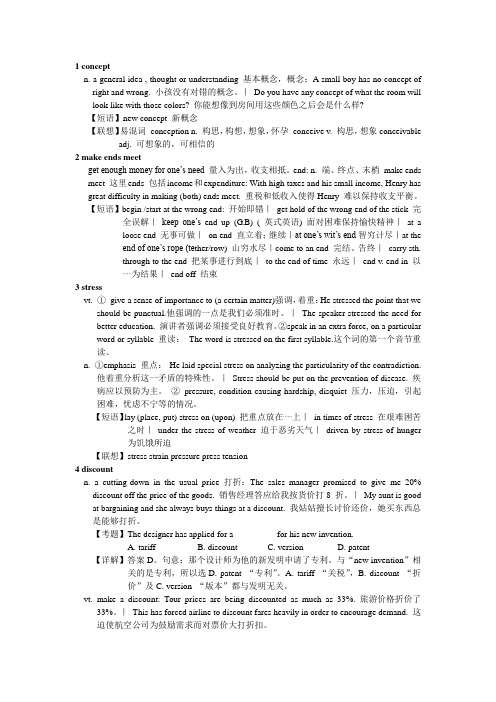
1 conceptn. a general idea , thought or understanding 基本概念,概念:A small boy has no concept of right and wrong. 小孩没有对错的概念。
|Do you have any concept of what the room will look like with those colors? 你能想像到房间用这些颜色之后会是什么样?【短语】new concept 新概念【联想】易混词conception n. 构思,构想,想象,怀孕conceive v. 构思,想象conceivable adj. 可想象的,可相信的2 make ends meetget enough money for one’s need 量入为出,收支相抵。
end: n. 端、终点、末梢make ends meet 这里ends 包括income和expenditure: With high taxes and his small income, Henry has great difficulty in making (both) ends meet. 重税和低收入使得Henry 难以保持收支平衡。
【短语】begin /start at the wrong end: 开始即错|get hold of the wrong end of the stick 完全误解|keep one’s end up (G.B) ( 英式英语) 面对困难保持愉快精神|at aloose end 无事可做|on end 直立着;继续|at one’s wit’s end智穷计尽|at theend of one’s rope (te ther/row) 山穷水尽|come to an end 完结、告终|carry sth.through to the end 把某事进行到底|to the end of time 永远|end v. end in 以⋯⋯为结果|end off 结束3 stressvt. ①give a sense of importance to (a certain matter)强调,着重:He stressed the point that we should be punctual.他强调的一点是我们必须准时。

Text A课文 AThe humanities: Out of date?人文学科:过时了吗?When the going gets tough, the tough takeaccounting. When the job market worsens, manystudents calculate they can't major in English orhistory. They have to study something that booststheir prospects of landing a job.当形势变得困难时,强者会去选学会计。
当就业市场恶化时,许多学生估算着他们不能再主修英语或历史。
他们得学一些能改善他们就业前景的东西。
The data show that as students have increasingly shouldered the ever-rising c ost of tuition,they have defected from the study of the humanities and toward applied science and "hard"skills that they bet will lead to employment. In oth er words, a college education is more andmore seen as a means for economic betterment rather than a means for human betterment.This is a trend that i s likely to persist and even accelerate.数据显示,随着学生肩负的学费不断增加,他们已从学习人文学科转向他们相信有益于将来就业的应用科学和“硬”技能。

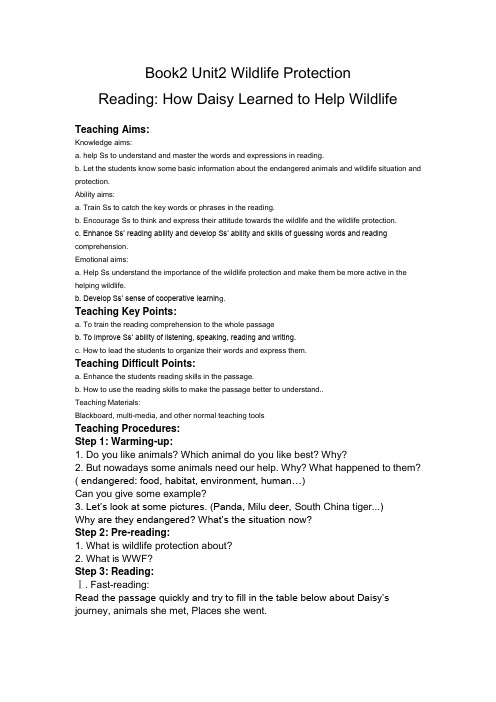
Book2 Unit2 Wildlife ProtectionReading: How Daisy Learned to Help WildlifeTeaching Aims:Knowledge aims:a. help Ss to understand and master the words and expressions in reading.b. Let the students know some basic information about the endangered animals and wildlife situation and protection.Ability aims:a. Train Ss to catch the key words or phrases in the reading.b. Encourage Ss to think and express their attitude towards the wildlife and the wildlife protection.c. Enhance Ss’ reading ability and develop Ss’ ability and skills of guessing words and reading comprehension.Emotional aims:a. Help Ss understand the importance of the wildlife protection and make them be more active in the helping wildlife.b. Develop Ss’ sense of cooperative learnin g.Teaching Key Points:a. To train the reading comprehension to the whole passageb. To improve Ss’ ability of listening, speaking, reading and writing.c. How to lead the students to organize their words and express them.Teaching Difficult Points:a. Enhance the students reading skills in the passage.b. How to use the reading skills to make the passage better to understand..Teaching Materials:Blackboard, multi-media, and other normal teaching toolsTeaching Procedures:Step 1:Warming-up:1. Do you like animals? Which animal do you like best? Why?2. But nowadays some animals need our help. Why? What happened to them? ( endangered: food, habitat, environment, human…)Can you give some example?3. Let’s look at some pictures. (Panda, Milu deer, South China tiger...)Why are they endangered? What’s the situation now?Step 2: Pre-reading:1. What is wildlife protection about?2. What is WWF?Step 3: Reading:Ⅰ. Fast-reading:Read the passage quickly and try to fill in the table below about Daisy’s journey, animals she met, Places she went.Ⅱ. Careful-reading:Part 1 .The situation for antelopes1. What did Daisy want to see first? Why? (pictures)(Antelopes. She would like to see the animals that gave fur to make her sweater.)2. What happened to them? How many left?(They are killed for fur and the wood and may be all gone. 7200 of them left.) Part 2 .A change of the situation for elephants and rhinos1. What’s the situation in the past?(They used to be hunted by farmers and became endangered in Zimbabwe.)2. What’s the situation now? (They are protected.)3. How does the change happen? (The government’s great help.)Part 3 .Learning to help wildlife1. Why did the monkey rub itself?(He found a millipede insect and rubbed it over his body to protect from mosquitoes.)2. How did Daisy want to help?(She wanted to tell WWF and began producing this new drug.)Ⅲ. After-reading:Listen to the tape and retell the text.One day, Daisy _________a strange dream. She flew in a wonderful_______to ______with an ______in Tibet. The antelope told her they were hunted because of their ____which can be used to make ____like hers. In three years they may all be______. Later, she ______to Zimbabwe where she talked with an _____ and got to know the farmers no longer ______them. That’s because the ______decided to help and the farmers finally made a lot of____. At last she ______at the thick rain _______where a monkey told her “No rain forest, no _____and no______.” Although finally everything was____, she had _______so much.Step 4: HomeworkIn this class, we have learned the great urgency of the wildlife protection. As a student, what should we do to protect the wild animals? List your own opinions and organize your words to write a short passage about your solutions.。

Unit 2 The Olympic GamesPart 1 AN INTERVIEWPausanias, who was a Greek writer about 2,000 years ago, has come on a magical journey on March 18th 2007 to find out about the present-day Olympic Games. He is now interview ing Li Yan, a volunteer for the 2008 Olympic Games.P: My name is Pausanias. I lived in what you call “Ancient Greece” and I used to write about the Olympic Games a long time ago. I’ve come to your time to find out about the present-day Olympic Games because I know that in 2004 they were held in my homeland. May I ask you some questions about the modern Olympics.L: Good heaven s! Have you really come from so long ago? But of course you can ask any questions you like. What would you like to know?P: How often do you hold your Games?L: Every four years. There are two main sets of Games — the Winter and Summer Olympics, and both are held every four years on a regular basis. The Winter Olympics are usually held two years before the Summer Games. Only athlete s who have reach ed the agreed standard for their event will be admit ted as competitor s. They may come from anywhere in the world.P: Winter Games? How can the runners enjoy competing in winter? And what about the horses?L: Oh no! There are no running race s or horse riding events. Instead there are competition s like skiing and ice skating which need snow and ice. That’s why they’re called the Winter Olympics. It’s in the Summer Olympics that you have the running races, together with swimming, sail ing and all the team sports.P: I see. Earlier you said that athletes are invited from all over the world. Do you mean the Greek world? Our Greek cities used to compete against each other just for the honour of winning. No other countries could join in, nor could slaves or women!L: Nowadays any country can take part if their athletes are good enough. There are over 250 sports and each one has its own standard. Women are not only allow ed, but play a very important role in gymnastics, athletic s, team sports and …P: Please wait a minute! All those events, all those countries and even women taking part! Where are all the athletes house d?L: For each Olympics, a special village is built for them to live in, a main reception building, several stadiums for competitions, and a gymnasium as well.P: That sound s very expensive. Does anyone want to host the Olympic Games?L: As a matter of fact, every country wants the opportunity. It’s a great responsibility but also a great honor to be chosen. There’s as much competition among countries to host the Olympics as to win Olympic medal s. The 2008 Olympics will be held in Beijing, China. Did you know that?P: Oh yes! You must be very proud.L: Certainly. And after that the 2012 Olympics will be held in London. They have already started planning for it. A new village for the athletes and all the stadiums will be built to the east of London. New medals will be design ed of course and …P: Did you say medals? So even the olive wreath has been replace d! Oh dear! Do you compete for prize money too?L: No, we don’t. it’s still all about being able to run faster, jump higher and throw further. That’s the motto of the Olympics, you know-- “Swifter, Higher and Stronger.”P: Well, that’s good news. How interestin g! Thank you so much for your time.Part 2 THE STORY OF ATLANTAAtlanta was a Greek princess. She was very beautiful and could run faster than any man in Greece. But she was not allowed to run and win glory for herself in the Olympic Games. She was so angry that she said to her father that she would not marry anyone who could not run faster than her. Her father said that she must marry, so Atlanta made a bargain with him. She said to him, “These are my rule s. When a man says he wants to marry me, I will run against him. If he cannot run as fast as me, he will be kill ed. No one will be pardon ed.”Many king s and prince s wanted to marry Atlanta, but when they heard of her rules they knew it was hopeless. So many of them sadly went home, but others stay ed to run the race. There was a man called Hippomenes who was amazed when he heard of Atlanta’s rules, “Why are these men so foolish?” he thought. “Why will they let themselves be killed because they cannot run as fast as this princess?”However, when he saw Atlanta come out of her house to run, Hippomenes changed his mind. “I will marry Atlanta--or die!” he said.The race started and although the man ran very fast, Atlanta ran faster. As Hippomenes watch ed he thought, “How can I run as fast as Atlanta?” He went to ask the Greek Goddess of Love for help. She promise d to help him and gave him three golden apples. She said, “Throw an apple in front of Atlanta when she is running past. When she stops to pick it up, you will be able to run pasther and win. Hippomenes took the apples and went to the King. He said, “I want to marry Atlanta.”The King was sad to see another man die, but Hippomenes said, “I will marry her---or die!” So the race began…。
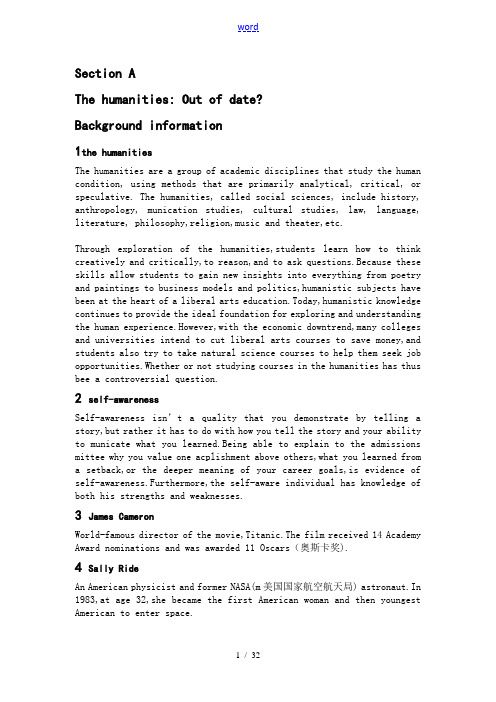
Section AThe humanities: Out of date?Background information1the humanitiesThe humanities are a group of academic disciplines that study the human condition, using methods that are primarily analytical, critical, or speculative. The humanities, called social sciences, include history, anthropology, munication studies, cultural studies, law, language, literature, philosophy,religion,music and theater,etc.Through exploration of the humanities,students learn how to think creatively and critically,to reason,and to ask questions.Because these skills allow students to gain new insights into everything from poetry and paintings to business models and politics,humanistic subjects have been at the heart of a liberal arts education.Today,humanistic knowledge continues to provide the ideal foundation for exploring and understanding the human experience.However,with the economic downtrend,many colleges and universities intend to cut liberal arts courses to save money,and students also try to take natural science courses to help them seek job opportunities.Whether or not studying courses in the humanities has thus bee a controversial question.2 self-awarenessSelf-awareness isn’t a quality that you demonstrate by telling a story,but rather it has to do with how you tell the story and your ability to municate what you learned.Being able to explain to the admissions mittee why you value one acplishment above others,what you learned from a setback,or the deeper meaning of your career goals,is evidence of self-awareness.Furthermore,the self-aware individual has knowledge of both his strengths and weaknesses.3 James CameronWorld-famous director of the movie,Titanic.The film received 14 Academy Award nominations and was awarded 11 Oscars(奥斯卡奖).4 Sally RideAn American physicist and former NASA(m美国国家航空航天局) astronaut.In 1983,at age 32,she became the first American woman and then youngest American to enter space.5 Bruce LeeA Chinese-American actor,martial arts instructor,philosopher,film director,film producer,and screenwriter.He was considered the most influential martial artist and a cultural icon.Born in San Francisco,he was raised in Hong Kong until his late teens.He moved back to the United States at 18 and studied philosophy at Washington University.6Gwyneth PaltrowAn American actress and singer.She gained worldwide recognition through her performance in Shakesperar in Love(1998),for which she won an Academy Award for Best Actress.7 Renee ZellwegerAn American actress and producer.She received two nominations for the Academy Award for Best Actress and won the Academy Award for Best Supporting Actress.8 Matt DamonAn American actor and screenwriter.He and his friend Ben Affleck won the Academy Award for Best Original Screenplay and the Golden Globe Award (金球奖) for Best Screenplay for their work—Good Will Hunting(1997).He also got multiple Best Actor nominations.9 Harold VarmusAn American Nobel Prize-winning scientist and the 14th and current Director of the National Cancer Institute.He was a co-recipient of the 1989 Nobel Prize in Physiology or Medicine for their work on the origins of cancer.10 Michael EisnerAn American businessman.He was the chief executive officer of The Walt Disney pany from 1984 until 2005.Detailed study of the text1 when the going gets tough,the tough take accounting.(Para.1)Meaning:When conditions or situations bee difficult,determined people choose to study the subject of accounting,hoping they can more easily find a job in the future.when the going gets tough:when the situation bees difficult当形势变得严峻时When the going gets tough,women can get as tough as men.当形势变得严峻时,女人可以变得跟男人一样坚强。
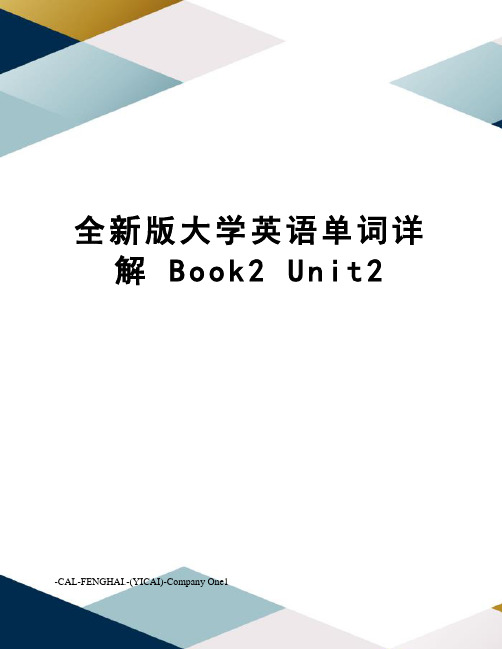
全新版大学英语单词详解B o o k2U n i t2-CAL-FENGHAI.-(YICAI)-Company One1Unit 2 ValuesText A A Life Full of Riches1. (L. 2) confront: vt.1) (of a problem, difficulty, etc.) face (sb.) threateningly* The difficulties that confront us seem insuperable.* A major difficulty that confronts international students is how best to judge the quality of a program in a foreign university.2) (of a person) face and deal with (a problem, difficulty, etc.)军人必须面对危险和死亡。
(=A soldier has to confront danger and death.)* Astronauts have to confront the unknown.be confronted with: be brought face to face(=The prisoner was confronted with his accusers.)* conclusions that can be confronted with experience2. (L. 3) donation: n. money or goods given for a good cause* The hospital receives a good deal of money in donations.他们对慈善事业慷慨捐助。
(=They made a generous donation to charity.)Collocation:a blood donation 献血make/give a donation 捐赠promise a donation 允诺捐助3. (L. 5) confusion: n. a state of uncertainty about what sth. means, etc.* The enemy retreated in great confusion.他们的突然到来打乱了我们的计划。

Unit 2 Section A VocabularyThe humanities: Out of date? accounting:n.[U] the work if accounting or the methods they use 会计;会计学Students’ major objective is to be financially well off. Accordingly, today the most popular course is not literature or history but accounting.calculate:vt.1)make a judgment about what is likely to happen using theavailable information估计;预测;推测It’s difficult to calculate the long-term effects of these changes in the law.2)find out how much sth. will cost, how long sth. will take, etc. by using numbers 计算,核算Nowadays the accountants in enterprise use computers to calculate the cost of production with accuracy.Boost:vt. increase or improve sth. to make it more successful 促进;推动;使兴旺Some countries hope that warmer weather and more rain willboost their farm output.Prospect:n. sth. that is possible or likely to happen in the future, or the possibility itself 可能的事情;很可能发生的事情;前景Career prospects in science and technology are virtually unlimited.Defect:Vt. leave a country, political party, or organization to go to another one 背叛;叛逃He defected from the party in the late 1970s.N.a fault in sb. or sth. 缺点;欠缺;不足之处Stammering is probably an inherited defect.Defect VS deficiency1在表示“人的缺点,设计制造方面的缺点或缺陷”时,名词defect和deficiency的词义相近。

